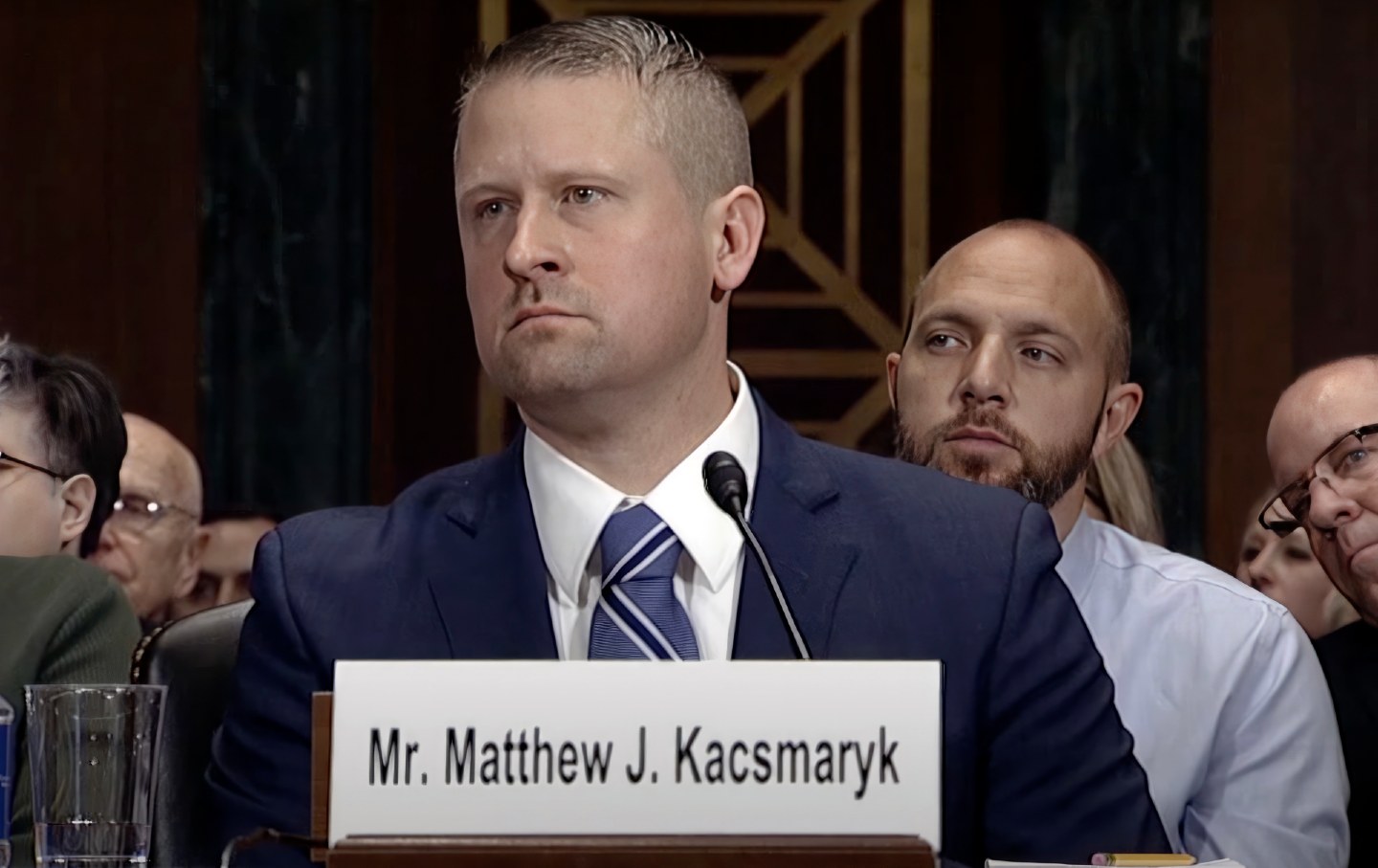A Texas Court Has Decided to Let the Scariest Judge in Texas Keep Being Scary
The Northern District of Texas has refused to adopt a policy reining in “judge shopping” and, with it, the power of “Mifepristone” Judge Matthew Kacsmaryk.

Matthew Kacsmaryk listens during his confirmation hearing before the Senate Judiciary Committee on Capitol Hill in Washington, on December 13, 2017.
(Senate Judiciary Committee via AP)If Democrats and good-faith Republicans want the members of the federal judiciary to behave like judges instead of weapons of mass destruction deployed by conservatives against women, people of color, the LGBTQ community, and the environment, they’ll need to pass legislation. Blue-ribbon committees, agency guidelines, congressional hearings, polite requests, and strongly worded letters are of no use. They have no impact on the extremist judges Donald Trump put in place, or the conservative judges emboldened by their example. Even legislation might not be enough, given that the Republican-controlled Supreme Court can and does simply overturn legislation it doesn’t like. But anything less than legislation is entirely pointless.
The latest evidence for this should-be-obvious fact comes from the Northern District of Texas. Late last week, the chief judge of that court rejected a rule made by the Judicial Conference. The Judicial Conference is a group of judges—including the chief justice of the Supreme Court, John Roberts, who serves as its presiding officer, and the chiefs of various courts of appeal, district courts, and some retired judges—that is supposed to make administrative rules for the entire federal judiciary. Last month, the conference made a rule aimed at stopping “judge shopping,” a practice that allows litigants to essentially pick their judge by filing lawsuits in certain districts. In most places, the practice is of limited value because, in most districts, judges are assigned to cases by random lot. But in Texas, judges are not assigned at random but on the basis of the courthouse where a case is filed.
In the Northern District of Texas, if a case is filed in Amarillo, litigants are sure to draw Judge Matthew Kacsmaryk. Kacsmaryk is a Trump-appointed Christian fundamentalist who acts like an inquisitor charged with bringing about the dominion of white men over everybody else, as he thinks God intended. He’s virulently anti-LGBTQ, despises reproductive rights, and is willing to embrace literally any crackpot legal theory that brings him his desired outcomes. Kacsmaryk is the person most responsible for the ongoing legal threat to the medical abortion pill mifepristone, as he is the judge who granted a group of doctors and dentists standing to challenge the Food and Drug Administration in a case they should have had no right to bring. The Supreme Court is currently deliberating that case.
Judges like Kacsmaryk put the conservative justices on the Supreme Court in a tight spot. Even though they’re all playing for the same bigoted and misogynist team and have the same conservative goals, what Kacsmaryk does cannot really be described as “law.” Kacsmaryk is like a guy who downloaded the Federalist Society generative AI platform on his phone, but doesn’t understand how to use it. He’s able to arrive at the approved conclusions, but the reasoning is garbled, which then forces the Supreme Court to try to preserve his rulings without fully accepting his risible and ridiculous reasoning.
To weaken his ability to embarrass the Supreme Court’s conservatives by constantly saying the quiet part out loud (and diminish the power of other litigants who use Texas district courts as chaos agents), the Judicial Conference’s new rule requires all districts, even Kacsmaryk’s, to make random assignments for all cases where the litigants seek a “nationwide injunction.” These are the big-ticket cases where the plaintiffs (which often include advocacy groups) are trying to get a single district court judge to stop a law (or ban a product) for the whole country. It’s a strategy used by both liberals and conservatives—conservatives use it to take away rights, and liberals, most recently, to stop or slow Trump’s policies—and it gives judges incredible power.
The Judicial Conference’s new rule would take away conservative groups’ ability to plant their cases before Kacsmaryk and instead make them draw from the entire pool of Northern District of Texas judges—a group that has plenty of conservatives but not all as ghoulish as Kacsmaryk.
It’s wise to view the Judicial Conference as John Roberts’s mouthpiece, and that’s especially true with this new rule. Roberts has written about the problems with judge-shopping in the past, and I’d argue that the stylings of Kacsmaryk bother him the most, because Roberts desperately wants to achieve what Kacsmaryk wants to achieve but through quieter, less legally belligerent means. Kacsmaryk, essentially, makes Roberts look bad and exposes his court as the grossly partisan institution that it is. I imagine Roberts views Kacsmaryk with the same disdain that a mob boss views an underling who goes out and buys a fur coat and a Cadillac the day after a major heist: Kacsmaryk exposes the whole operation because he can’t show a modicum of restraint.
However, despite the fact that this rule essentially came from the chief justice of the Supreme Court, the Northern District of Texas simply said “no.” David Godbey, Kacsmaryk’s boss and chief judge of the Northern District of Texas, replied to a letter from Senate majority leader Charles Schumer urging him to adopt the new rule with a letter of his own, which said: “The consensus [among the district’s judges] was not to make any change to our case assignment process at this time.” Translation: “Go to hell, Chuck” and probably “Remember the Alamo!”
Godbey can and will get away with this flat rejection of the new rule because the Judicial Conference’s administrative guidelines are simply that: guidelines. The Judicial Conference was set up by Congress in 1922 as an advisory board, one that makes recommendations about how the courts should operate but not one that actually has the authority to implement its recommendations. That power remains squarely with Congress.
Courts usually follow the guidelines, but they don’t have to. If we’ve learned anything about today’s ultraconservatives, it’s that they don’t respect the soft power of traditions and norms. Really, it’s only Democrats like Joe Manchin and Dick Durbin who are desperate to preserve norms; Republicans and conservative judges are interested purely in winning and reshaping the law in their curdled image.
As if to prove this point, the Northern District rejected the Judicial Conference guidance at the behest of Senate minority leader Mitch McConnell. McConnell told district courts to straight-up ignore the Judicial Conference, calling the new rule “half-baked guidance that does Washington Democrats’ bidding.” Again, this guidance is not coming from Washington Democrats so much as it is coming from the chief justice and, most likely, other conservative jurists who are sick of Kacsmaryk embarrassing them. But Kacsmaryk is useful to Republicans and other movement conservatives who want to reshape the country faster than Roberts will let them.
If “Washington Democrats” actually want to have a say in any of this, they need to pass a bill. Senator Mazie Hirono introduced one last year called the “Stop Judge Shopping Act” which would do through legislation exactly what the Judicial Conference attempted to do through guidance. But it went nowhere in the Senate. It didn’t even make it out of the Judiciary Committee (which Hirono is on).
Putting aside the Republican-controlled House for a second, I really can’t explain why the Democrats didn’t rally around it. I can’t explain why another bill Hirono cosponsored in 2021, the “Supreme Court Ethics Act,” also failed to make it out of the Judiciary Committee. I do not know why the president hasn’t put a number of these bills together and sold them as part of a larger court reform package. I don’t know why “You shouldn’t get to pick your own judge” isn’t a standard line in every Joe Biden stump speech while he runs for reelection. I, frankly, don’t know what the Democrats are doing or why they seem so content to just let the federal judiciary kick their asses every day and take their lunch money. I don’t know why these people we elected won’t fight back against the people nobody elected.
I do know that if you want to stop people like Kacsmaryk—a man who should be on a poster under the tagline “He’s coming for your contraceptives next!” in every Democratic attack ad in every state—you actually have to pass legislation. You have to rally public support behind the legislation and explain to the people why it’s needed. You have to try. You have to lead, or get the hell out of the way.
Take a stand against Trump and support The Nation!
In this moment of crisis, we need a unified, progressive opposition to Donald Trump.
We’re starting to see one take shape in the streets and at ballot boxes across the country: from New York City mayoral candidate Zohran Mamdani’s campaign focused on affordability, to communities protecting their neighbors from ICE, to the senators opposing arms shipments to Israel.
The Democratic Party has an urgent choice to make: Will it embrace a politics that is principled and popular, or will it continue to insist on losing elections with the out-of-touch elites and consultants that got us here?
At The Nation, we know which side we’re on. Every day, we make the case for a more democratic and equal world by championing progressive leaders, lifting up movements fighting for justice, and exposing the oligarchs and corporations profiting at the expense of us all. Our independent journalism informs and empowers progressives across the country and helps bring this politics to new readers ready to join the fight.
We need your help to continue this work. Will you donate to support The Nation’s independent journalism? Every contribution goes to our award-winning reporting, analysis, and commentary.
Thank you for helping us take on Trump and build the just society we know is possible.
Sincerely,
Bhaskar Sunkara
President, The Nation








